INSIGHTS & TAKEAWAYS
FROM EFICO’S SUSTAINABILITY TEAM FOR EUDR COMPLIANCE
A Focus on Forest Preservation and EUDR Compliance
EUDR compliance remains a controversial and complex topic -as highlighted by recent developments.
On Tuesday 17 December 2024, Parliament adopted the provisional political agreement with the Council to delay the application of the EU Deforestation Regulation. Large operators and traders will now have to respect the obligations of this regulation as of 30 December 2025, and micro- and small enterprises from 30 June 2026. This additional time is intended to help companies around the world implement the rules more smoothly from the date of application, without undermining the objectives of the law.
Before the one-year delay can enter into force, the agreed text also has to be endorsed by the Council and published in the EU Official Journal before the end of 2024 -a process unlikely to encounter further issues.
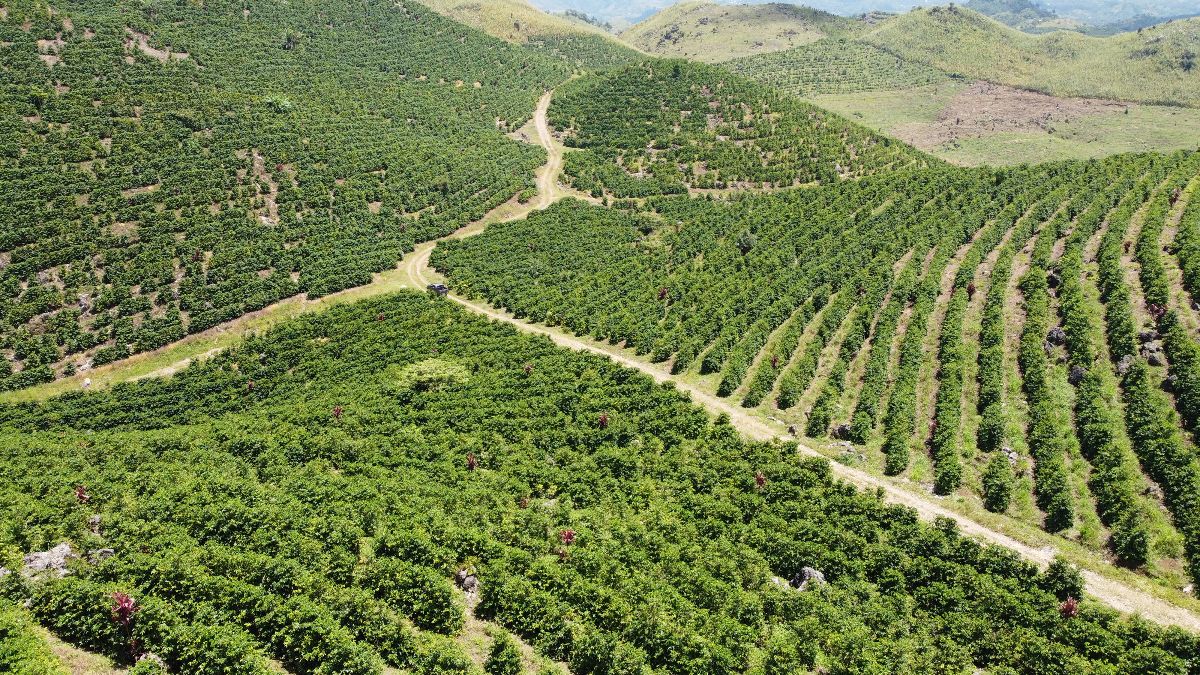
EFICO: Ready for EUDR Compliance
Anytime and Beyond
At EFICO, we have been closely monitoring the developments surrounding the EUDR to ensure we are fully prepared for its implementation, no matter the timeline. Our commitment to full compliance with the EUDR remains steadfast. The extra time granted will allow us to delve deeper into the requirements, enabling us to provide even greater value.
Leading these efforts is EFICO’s Sustainability Team -a diverse, international, and multilingual group of dedicated women who have been on top of it for some time now, coordinating, initiating, and advancing our green coffee goals. They’ve been driving our progress behind the scenes, ensuring we stay ahead of the curve. Recently, we sat down with them to gain firsthand insights into their work on EUDR compliance. They shared their field experiences and framed them within the broader coffee landscape, providing valuable takeaways for European roasters and stakeholders.
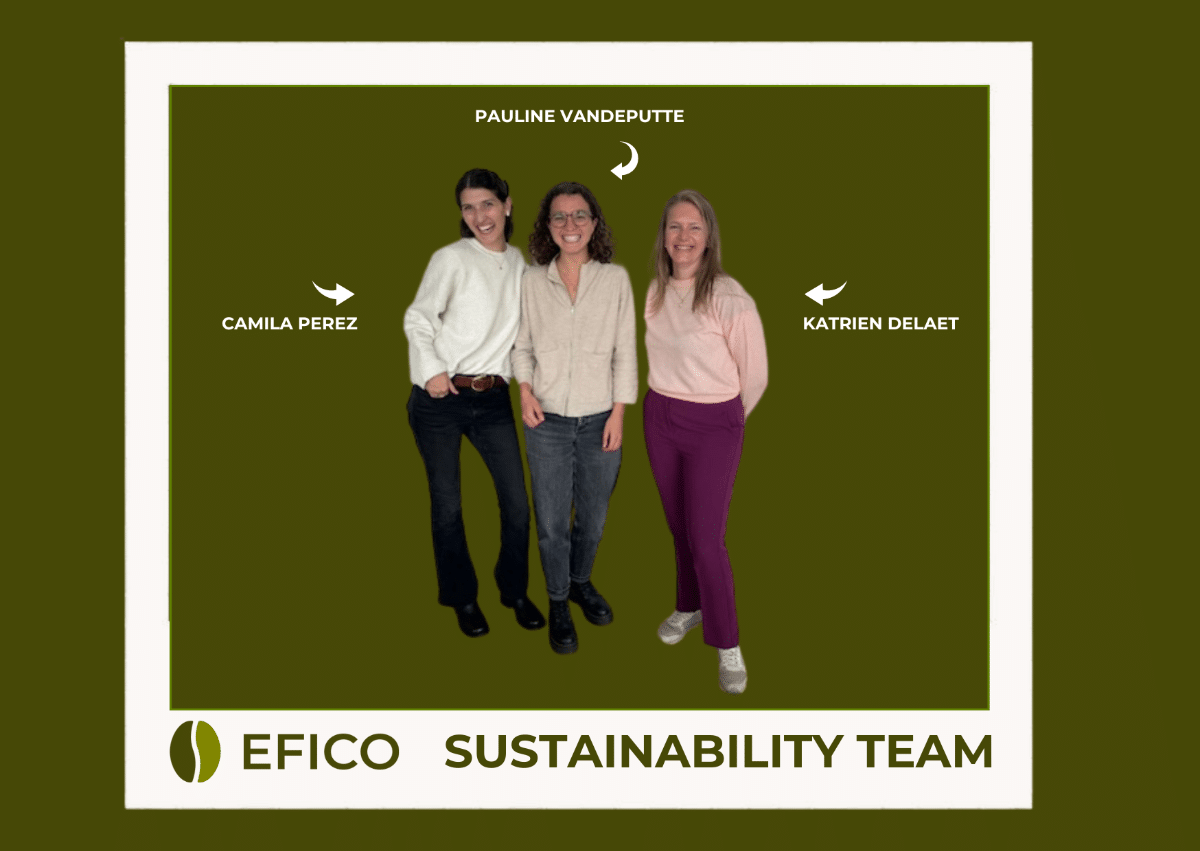
As experts in EUDR-related matters, they are well-positioned to offer tailored support to EFICO’s partner producers, exporters and roasters, guiding them on the path to sustainable, deforestation-free coffee.
This reflects EFICO’s personalised approach to EUDR compliance: ensuring alignment across the entire coffee value chain, minimising duplicated efforts, and openly sharing insights and practical tips. At EFICO, it’s all about personalised strategies, customised advice, and building purposeful partnerships.
A Conversation with EFICO’s Sustainability Team
Key Insights, Practical Takeaways and Best Practices for EUDR Compliance for our Partners
I. IMPACT OF EUDR ON COFFEE PRODUCERS
The EU Deforestation Regulation (EUDR) -one of the most stringent and comprehensive environmental laws in the EU, aims to ensure that 7 key consumer goods (soy, cattle, oil palm, wood, cacao, coffee and natural rubber) and some of their derivatives placed on the EU market are free from deforestation.
For our coffee sector, this translates as follows:
Fundamentally, the EUDR dictates that all coffee entering or leaving the EU must comply with these principles:
- Deforestation-Free: Ensuring that coffee products purchased, used, and consumed by Europeans do not contribute to deforestation or forest degradation, both within the EU and globally.
- Compliance with Local Legislation: Coffee must adhere to relevant legislation in its country of production -including laws on environment, land use, forest governance, labour, tax, and human rights.
- Due Diligence: Each shipment must be accompanied by a due diligence statement, confirming minimal risk of non-compliance with EUDR requirements.
The workload* for mapping coffee plots under the EUDR largely falls on farmers and producers with the support of exporters, importers and governmental and non-governmental organisations. The coffee producers with less than 4 hectares of coffee land are required to provide a GPS pin marking the center of their plot, while producers with more than 4 hectares of coffee must also use ‘polygon mapping’, a more detailed method that outlines the boundaries of each plot.
This strict, zero-tolerance approach, where products are either compliant or not, places significant pressure on importers (in our sector: importers of green coffee, decaffeinated coffee, roasted coffee, and other coffee derivatives) to ensure accurate and comprehensive data collection.
A. EFICO x PRODUCER PARTNERS
EUDR COMPLIANCE VS FIELD REALITY
‘Farmers in developing countries are now suddenly expected to have smartphones and become tech-savvy enough to map their coffee growing areas and interpret satellite imagery’, explains Katrien Delaet. ‘While the technological demands, such as handling geo-location data, are already challenging, the legal obstacles are even harder to overcome. In many of these regions, land ownership is often uncertain. As a result, the EUDR legislation can feel disconnected from the practical realities these farmers face on the ground.’
Katrien continues: ‘So maybe let’s start by addressing the in-the-field realities, such as the challenges related to boundaries and the associated costs of data collection for smallholder farmers. Farmers must be involved in identifying plot boundaries, as they know the land best. Mapping every farm, especially for smallholders, involves significant resources, including time, human, and financial expenses. Even getting to remote farms is challenging due to poor infrastructure, and many farmers don’t live near their plots.’

Pauline Vandeputte -Value Chain Expert & Sustainability: ‘The EUDR mandates geolocation for every coffee plot to demonstrate that no deforestation occurred after 30/12/2020. This involves advanced geolocation techniques and ground-truthing, often requiring enumerators and farmers to work together. There’s a significant gap between the expectations set by EUDR regulators and the realities faced by farmers and data collectors on the ground. In many African countries, farmers frequently rely on informal methods, such as memory or handwritten notebooks, to manage their business data.’
Katrien agrees and concludes: ‘Collecting accurate, formalised data for regulatory purposes is quite a challenge. The process is more effective when personal relationships are built, because qualitative insights are more easily gathered when data collectors build a relationship with farmers. Something that we at EFICO and CUPRIMA are fortunately used to doing naturally and well and enjoy doing over the years, building purposeful partnerships. This is always beneficial, but especially needed right now.’

Camila Perez, who joined the Sustainability team very recently as GIS Data & Sustainability Officer, shares: ‘I was quickly thrown into the deep end! At the moment, my role involves coordinating the collection and analysis of GIS datasets, assessing deforestation risks with external partners, and reviewing critical cases with EFICO & CUPRIMA’s coffee-producing partners. Later on, I will help refine internal methods, enhance risk analysis, and design systems to track our social and environmental impact. I’ll also be involved in setting up new data collection projects from farm to customer, focusing on full traceability and sustainability. I’m looking forward to assisting with hands-on work in the countries of origin!’
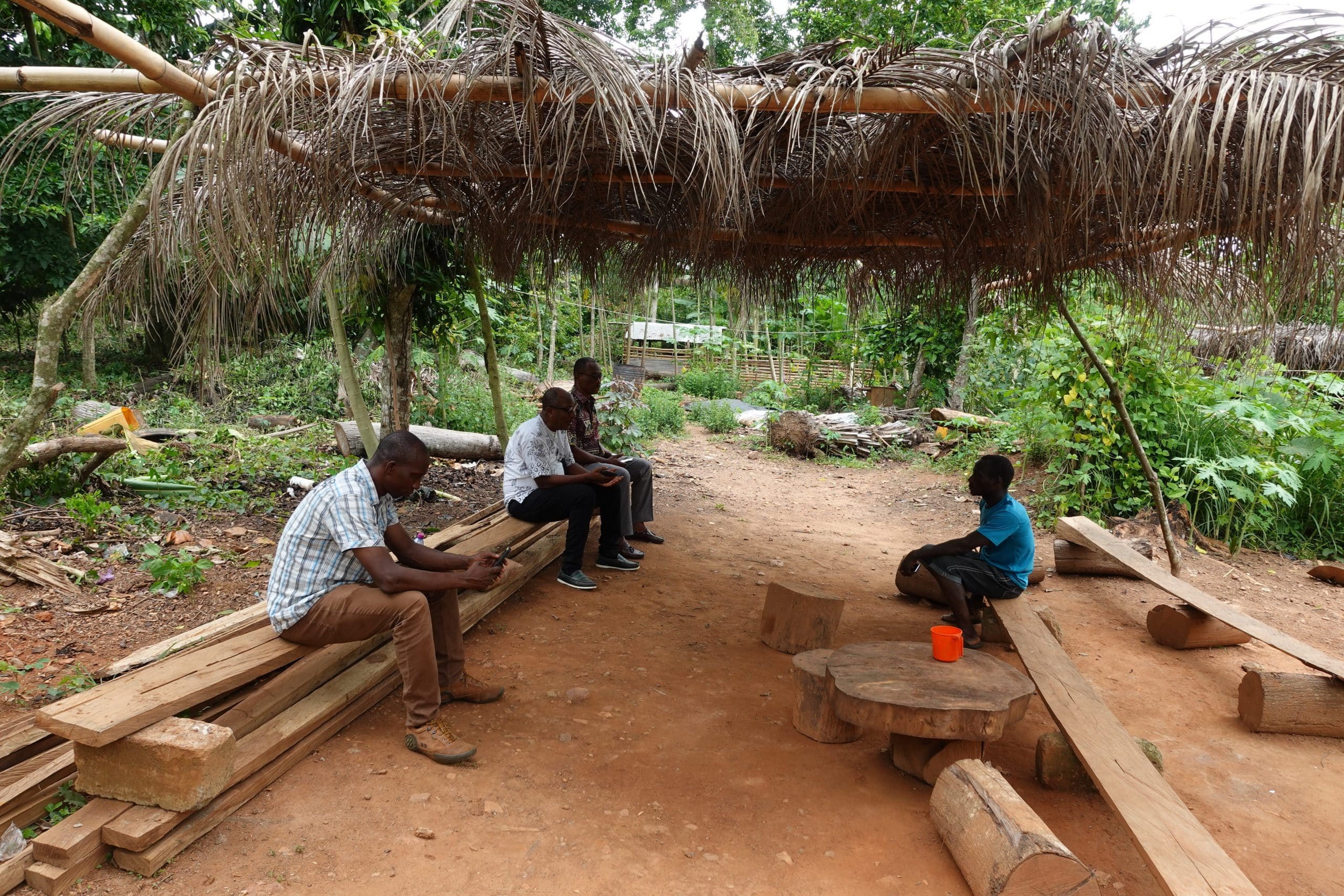
B. EFICO’S TAKEAWAYS
→ Any EUDR compliance effort must consider the socio-economic realities faced by smallholder farmers, who risk losing market access if they cannot meet the requirements. Developing an inclusive approach should be a priority when building sustainable supply chains.
→ While technology -such as satellite data, is crucial for compliance, manual interventions and human judgment are often needed to correct inaccuracies and ensure reliable results; ground truthing is a must!
→ These challenges and insights emphasise the need for realistic and context-sensitive approaches to EUDR compliance, balancing regulatory demands with the practical needs and limitations of farmers and supply chain participants, specific to each country of origin.
→ The EUDR regulation is still evolving, with several grey areas remaining in the legislation. Additionally, many countries of origin face ongoing political and economic instability, presenting significant challenges. A one-size-fits-all approach simply doesn’t exist.
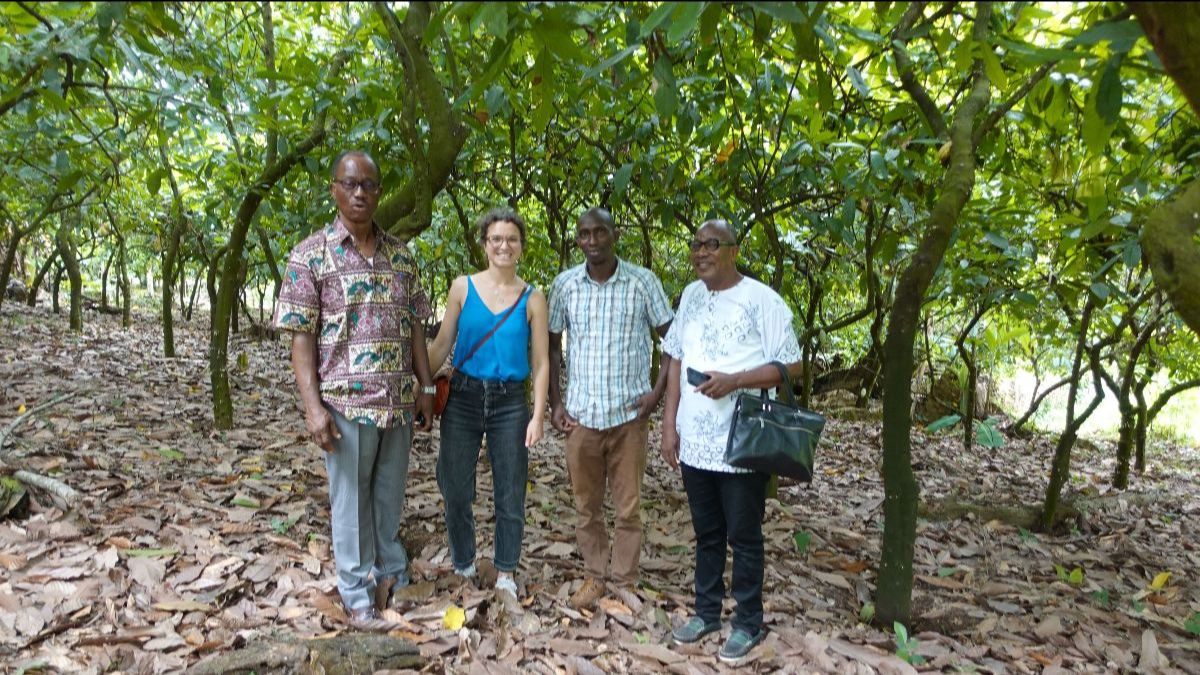
C. EFICO’S APPROACH
→ CUPRIMA’s approach emphasises enhancing supply chain transparency while providing tailored support through direct contact and dialogue with our producer partners. Recognising the pressures this regulation can impose on farmers, our strategy is flexible, collaborative, and progressive.
→ CUPRIMA works closely with its partner producers to ensure compliance without adding unnecessary pressure. We provide clear data requirements for geolocation, traceability, legality, and harvest periods.
→ To avoid duplicating efforts and incurring unnecessary verification costs, CUPRIMA allows suppliers to submit risk assessments conducted by other approved service providers. Our approach is tailored with tiered engagement levels, ranging from basic data submission to comprehensive risk assessments. By adapting to each supplier’s needs, we ensure compliance while minimising additional burdens.
→ Sustainability has been at the heart of EFICO/CUPRIMA since the beginning. With the EUDR regulations on the horizon, we have expanded the team with two full-time sustainability experts. They are here to assist our partner farmers and roasters in navigating these new regulations, helping us all maintain the highest standards of sustainability.
II. IMPACT OF EUDR ON COFFEE TRADERS & ROASTERS IN THE EUROPEAN BEAN SCENE
We’ve discussed EFICO’s role in informing and supporting partner producers at origin. Now, let’s shift the focus to the impact of the EUDR on European roasters and how EFICO supports them in navigating this process.
Katrien: ‘The Regulation was published in the Official Journal of the European Union on June 9, 2023, and took effect on June 29, 2023. For now, the actual enforcement is set to begin on 30 December 2025 for most companies and on 30 June 2026, for micro- and small enterprises. It’s important to note that the European Commission’s proposed 1-year phase-in period is still pending approval by the European Parliament and the Council, which could potentially delay these dates by an additional year. Rest assured, we will stay on top of things and be ready whenever needed.’
Katrien acknowledges: ‘It’s an understatement to say that the impact on the coffee industry is immense, affecting most supply chain actors. Non-compliance could result in fines of up to 4% of annual turnover, potential confiscation of shipments, and losing access to a market that represents over a third of global coffee consumption. For many traders and roasters, these consequences could be catastrophic. However, despite these challenges, the EUDR legislation also presents significant opportunities. It promotes closer collaboration with both producer and roaster partners, leading to stronger, more enduring partnerships.’
Katrien explains: ‘Companies with inadequate policies on deforestation and biodiversity are facing challenging times, but EFICO just needs to step up a gear and make some extra efforts, as the EUDR aligns with the sustainability goals and standards we have been investing in for years, even before these regulations were introduced.’
Katrien emphasises and advises: ‘Certified coffee goes beyond conventional options, with major certification bodies such as Rainforest Alliance and Fairtrade already aligning their standards with EUDR requirements. These certifications are essential in helping coffee importers meet data collection obligations, particularly regarding legal aspects.
This gives EFICO a significant advantage, as we offer a wide range of certified coffees. However, certification alone does not guarantee EUDR compliance! Farmers must voluntarily meet the requirements ahead of their audits, and operators remain liable for any non-compliance. That is why, at EFICO, we always perform additional due diligence to ensure full compliance with legal standards.’
A. EFICO X ROASTER PARTNERS
EUDR COMPLIANCE VS EUROPEAN BEAN SCENE REALITY
What are EFICO’s responsibilities as an importer/operator under the EUDR regulation, and how does it impact their coffee roasters customers?
Pauline: ‘As an importer/operator, EFICO must ensure that all their coffees are traceable to their origin, specifically to the plot of land where the coffee is produced. This includes providing geolocation data for the production area. EFICO must also assess and address the risk of their products contributing to deforestation by examining supply chains to ensure legal and environmental compliance in the country of origin.’
Katrien continues: ‘Once documentation confirms there is no or negligible risk of non-compliance, EFICO must submit a Due Diligence Statement (DDS) through the EU Information System (TRACES). This submission generates a DDS reference number, which is necessary for the coffee’s release for circulation within or export from the EU market.’
‘Once the coffee is cleared by customs for free circulation in the EU, the requirements change’, Katrien explains. ‘Large downstream operators (such as processors, roasters or decaffeinators,) must meet similar due diligence obligations and submit a DDS based on a previous reference number. In contrast, SMEs are not required to submit a due diligence declaration for products already covered by another economic operator. They only need to provide the reference number of the existing declaration if requested.’
Katrien: ‘Once the EUDR enters into application, we will consistently include our DDS numbers on every invoice to directly prove our compliance, ensuring automatic and direct information transfer to our small and medium-sized customers. Additionally, our large sized customers will find a security token on the EFICO invoice, which provides them with direct access to data on the EU platform.’
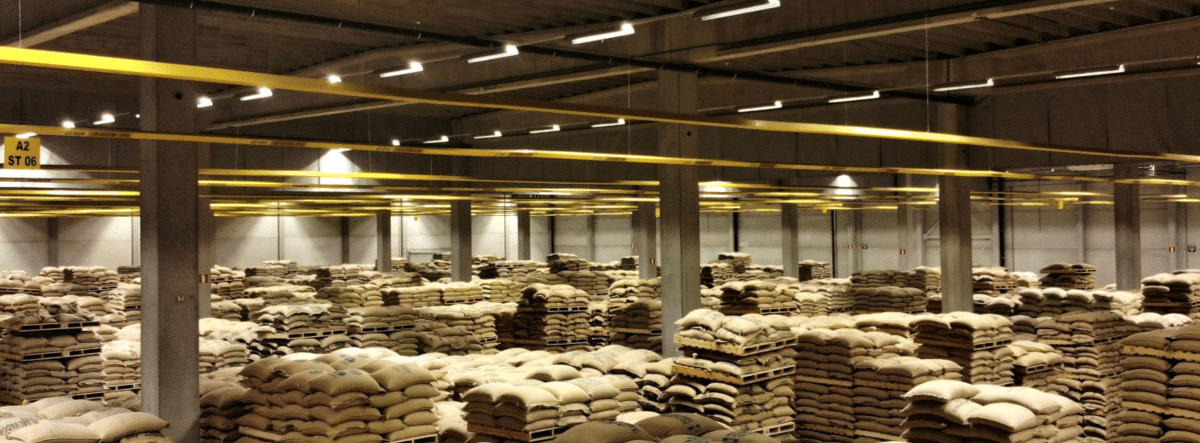
B. EFICO’s TAKEAWAYS
→ The EUDR stands out from other legislation by being product-based and focusing on prohibitions. In contrast, the CSDDD (Corporate Sustainability Due Diligence Directive) for example requires companies to address human rights and environmental risks in their supply chains, while the German Supply Chain Act (LkSG) emphasises companies’ responsibility to ensure due diligence and prevent harm in their supply chains. Both the CSDDD and LkSG focus on best efforts to manage risks, whereas the EUDR takes a stricter approach by banning products linked to deforestation.
→ European roasters play a crucial role in the coffee supply chain and are directly affected by the EUDR. The regulation mandates that all European operators, including roasters, ensure their products are free from deforestation and meet the legal requirements of the country of origin.
→ European roasters must meet due diligence obligations before selling or distributing roasted coffee or processed products within the EU, ensuring their products comply with all criteria set by the regulation.
→ If European roasters process green coffee beans (e.g. by roasting it) after the enforcement date of 30 December 2025, they must provide evidence that the coffee was placed on the EU market before this date (as per order request, transport document, or invoice). Or in case the coffee is made with beans introduced to the market after 30 December 2025, they must demonstrate that the beans are deforestation-free by providing the respective DDS number.
→ In the context of the EUDR, it is once again clear that building long-term partnerships is both useful and necessary. Additionally, direct involvement with the EUDR regulations -such as ensuring full transparency and traceability, can potentially lead to new insights into market setting and commercialisation.
C. EFICO’S APPROACH
→ EFICO’s approach focuses on enhancing supply chain transparency.
→ At EFICO, we collaborate closely with our partner roasters, offering clear data requirements to help facilitate compliance with the EUDR.
→ EFICO makes compliance easy and hassle-free by streamlining the process. Upon the enforcement date of the EUDR legislation -starting 30 December 2025, every EFICO invoice will include the DDS reference number from the EU IT platform for coffee imported and cleared after this date. This ensures compliance with geolocation and legality requirements, while batches cleared before this date are exempt. Additionally, our larger customers will receive a security token to access the EU platform.
→ All coffee imported on or after the EUDR’s enforcement date will be subject to EUDR regulations. However, coffee that EFICO has in stock prior to this date will not be subject to these regulations.
→ If needed, EFICO is available to provide detailed information to demonstrate compliance during controls or audits by your competent authorities.
ARE YOU STILL HAVING TROUBLE SEEING THE FOREST FOR THE TREES?
Then you can always consult the updated FAQs published by the European Union; they are particularly insightful for a better understanding.
Our sustainability team has been actively engaged as well. Here is a careful selection of the questions we’ve been asked most frequently in recent weeks.
EUDR FAQ’s – curated by our Sustainability Team
- How does EFICO collect the necessary geolocation data?
Geolocation data collection is managed by our suppliers, as EFICO does not own farms or plantations. However, we work closely with our partner producers to ensure they understand and meet the stringent requirements of the EUDR. We provide detailed guidelines, along with ad-hoc training sessions, to help them comply. Additionally, EFICO offers direct support to origins that may lack the necessary knowledge and capacity, particularly those at higher risk of EU market exclusion. - When and how will EFICO share geolocation data with clients?
EFICO will share geolocation data with clients whenever the EUDR legislation enters into application on 30 December 2025.
-For large clients, relevant geolocation data in GeoJSON format will be accessible via the EU’s IT system (TRACES) using the DDS number and security token provided on the EFICO invoice.
-For SME clients, storing geolocation data is not mandatory. The DDS number provided on the EFICO invoice will be sufficient to meet the requirements.
Heads up! For coffee placed on the market before the EUDR enforcement date, the EFICO invoice will specify that customs clearance was completed prior to the enforcement date. Therefore, DDS and geolocation data will not be mandatory for these shipments. - Can EFICO share geolocation data for products purchased in the past?
In compliance with privacy and data security regulations, EFICO is unable to provide geolocation data for purchases of beans that were customs cleared before the EUDR enforcement date on 30 December 2025. - What information will EFICO provide prior to shipment?
Due to time constraints and the need to gather and pre-validate datasets from the origin, we do not typically provide geolocation data in advance for clients for whom we handle customs clearance. However, exceptions may be made for specific origins or suppliers if clients have concerns, which will be reviewed on a case-by-case basis. - How will we know if the coffee sold/bought is EUDR compliant?
EUDR compliance is determined by the customs clearance date, not the arrival date in the EU. As a result, in early 2026, clients may receive coffee lots with or without a DDS number, depending on when customs clearance was completed for each lot. This will be clearly indicated on the EFICO invoices. - How does EFICO ensure traceability from physical coffee to geolocation coordinates?
For each geolocation dataset submission, suppliers must inform EFICO of the data’s source (whether collected by the farmer, verified by an external third-party auditor, or obtained through other means) and provide supporting documentation. For certified coffee, we use traceability systems from independent certification bodies or national systems in advanced producing countries (e.g., Costa Rica). EFICO is also committed to building a comprehensive traceability system for its entire value chain as part of its sustainability strategy. - What happens if products are found to be non-compliant?
To prevent non-compliance, we encourage suppliers to share their geolocation datasets with us for pre-validation before finalising contracts with EFICO. This enables us to detect potential issues even before the crop season begins.
Once contracts are finalised, suppliers must submit geolocation and legality information at least one month before shipment. If deforestation is discovered on declared coffee plots, suppliers are notified and may challenge the findings with supporting evidence, such as geotagged photos, drone footage, or satellite images. If non-compliance is confirmed, suppliers must segregate the affected products and provide proper documentation. In extreme cases, if non-compliance is detected upon arrival in the EU, the products will be replaced with compliant coffee, and the non-compliant coffee will be redirected to other markets. - When will EFICO be ready to comply with the EUDR?
Our internal Due Diligence System will be fully operational as from the date of enforcement. This means we will not be able to provide DDS numbers until then. As outlined in the Regulation, the DDS codes would become available by December 30, 2025.
FOOTNOTE, DEFINITION & REFERENCES
|
